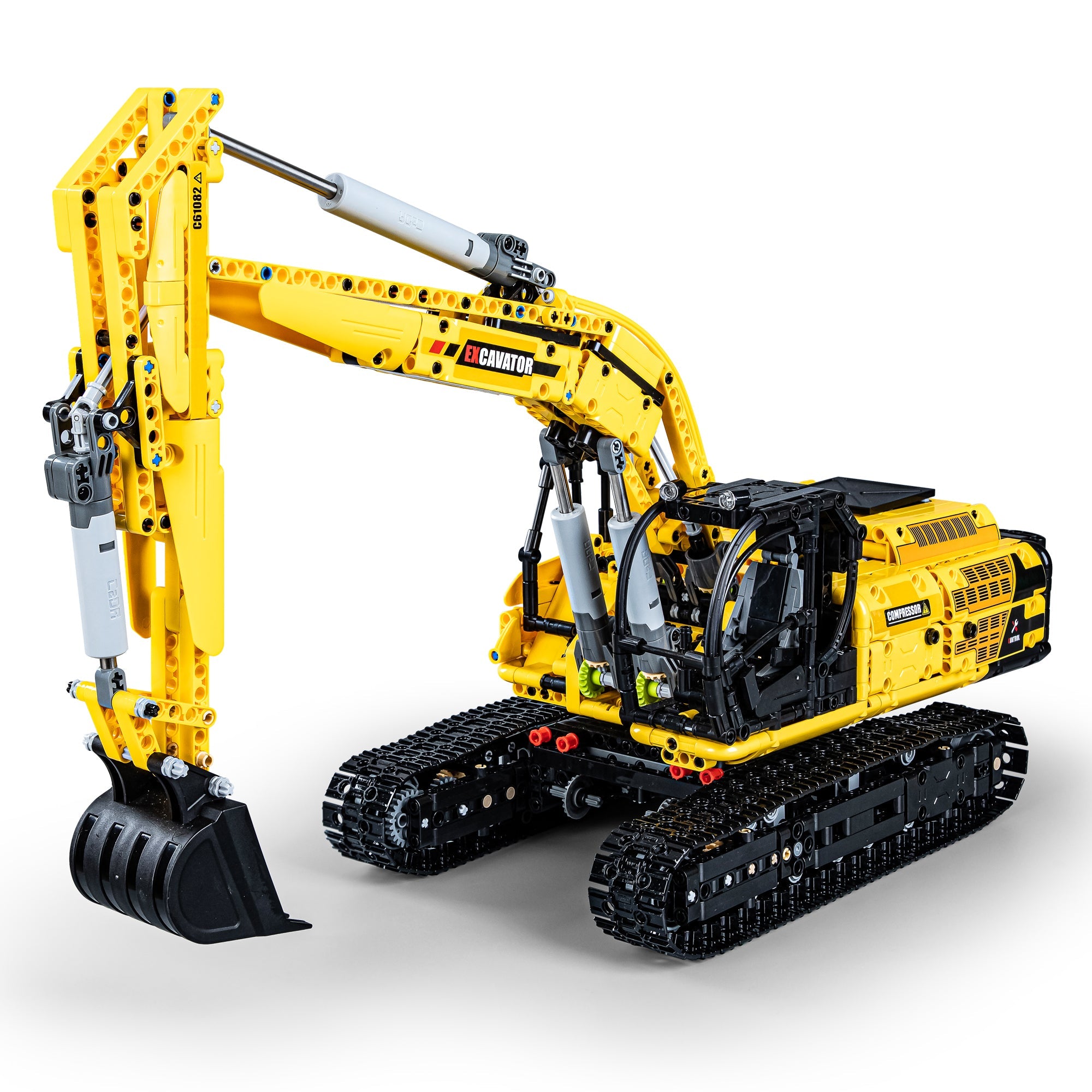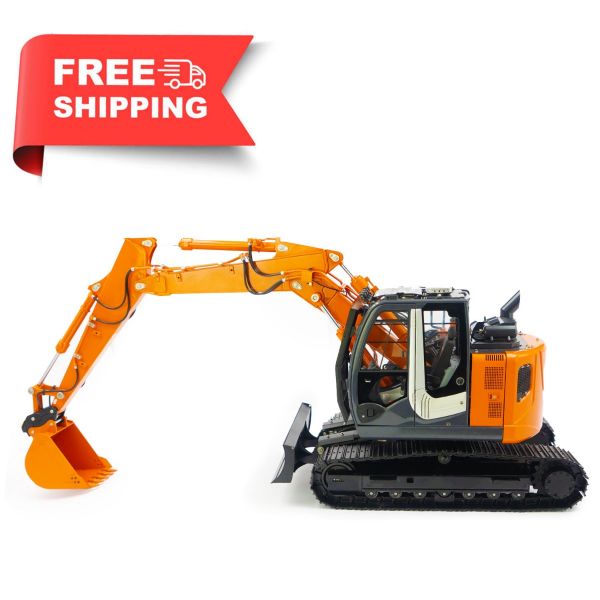Understanding Exactly How Excavator Works and Its Effect On Effectiveness
Excavators play a vital duty in building and construction and mining procedures, depending on a complex interaction of mechanical and hydraulic systems. Their capability to perform a selection of tasks rests on both their style and the innovation incorporated within. Recognizing these parts can significantly influence functional efficiency and efficiency. As developments proceed to improve the sector, one need to take into consideration exactly how these changes will certainly affect future techniques and efficiency.
The Fundamentals of Excavator Mechanics

The Role of Hydraulic Solutions in Excavators
At the heart of excavator operation lies the hydraulic system, which plays a critical duty in powering the equipment's functions and movements. This system uses pressurized hydraulic liquid to transfer power, allowing various activities such as moving, training, and digging. By utilizing the principles of hydraulics, excavators can perform jobs with exceptional precision and pressure, boosting overall functional efficiency.The hydraulic system consists of essential elements, consisting of pumps, valves, and cylinders, which collaborate to regulate the circulation and direction of the liquid. When the operator engages the controls, the hydraulic liquid is directed to specific cylinders, converting the driver's commands into physical motion. This system enables for smooth and responsive activities, which are important in construction and excavation environments. double e volvo rc excavator. The performance of the hydraulic system directly affects the productivity and versatility of the excavator, making it an essential element in contemporary excavation processes
Trick Components of an Excavator
Understanding the crucial elements of an excavator is crucial for understanding just how this effective device runs. An excavator contains a number of substantial aspects, including the undercarriage, home, arm, pail, and boom. The undercarriage gives stability and wheelchair, usually featuring wheels or tracks to navigate numerous terrains. Your house has the engine and hydraulic systems, enabling the operator to regulate activity and power the equipment. The boom extends from the house, enabling upright reach, while the arm attaches to the bucket, assisting in digging and lifting operations.Additionally, the taxi houses the operator, outfitted with controls for exact maneuvering. Each of these components plays an essential role in the excavator's overall functionality, adding to its effectiveness and effectiveness on building websites. Recognizing these parts assists in optimizing and preserving excavator performance, ensuring jobs are completed safely and properly.
Add-on Convenience and Its Benefits
Attachment convenience is a necessary aspect of excavators, making it possible for drivers to switch over between numerous tools tailored for certain jobs. This adaptability not only enhances job effectiveness however likewise adds to cost-effectiveness by decreasing the need for multiple makers. Recognizing the various kinds of add-ons readily available can considerably affect the total efficiency and performance of an excavator on job sites.
Types of Attachments
While excavators are mostly acknowledged for their digging capabilities, their true versatility depends on the vast range of attachments readily available. These attachments improve the excavator's performance, allowing it to execute numerous jobs past excavation. Typical accessories consist of buckets (for excavating and scooping), hydraulic thumbs (for understanding products), and augers (for drilling holes) Grapples are used for relocating and taking care of debris, while rippers can break up hard surface areas. Various other specialized add-ons, such as plates and plows, enable excavators to adjust to details task demands. This variety not just boosts the equipment's utility throughout different markets, consisting of landscape design, building and construction, and demolition, yet additionally enables operators to tailor their devices to fulfill certain project demands effectively.
Boosted Work Efficiency
Making the most of work efficiency is a main advantage of utilizing different excavator add-ons. Different add-ons allow an excavator to carry out several tasks without needing to switch devices, conserving useful time and labor. Making use of a hydraulic hammer can damage concrete while a bucket attachment can excavate soil, allowing a smooth workflow. This flexibility minimizes downtime connected with tools changes and enhances efficiency on-site. In addition, specialized attachments enhance accuracy in jobs such as grading or landscaping, resulting in greater top quality outcomes. The ability to adapt to various job demands not just enhances operations however likewise lessens the requirement for added equipment, making sure that tasks are finished quickly and effectively. Overall, accessory versatility considerably contributes to boosted task effectiveness in excavation job.
Cost-Effectiveness and Adaptability
Cost-effectiveness is a significant advantage of making use of functional excavator add-ons. These accessories permit a single excavator to perform numerous tasks, reducing the need for added machinery and labor - double e volvo rc excavator. By switching between pails, hammers, and grapples, operators can deal with different projects, from digging to demolition, therefore taking full advantage of equipment utilization. This adaptability not just lowers functional costs but also lessens downtime linked with changing devices. In addition, the capacity to personalize excavators with specialized attachments enhances efficiency, as they can efficiently take care of varied jobs according to task needs. In conclusion, the combination of cost-effectiveness and convenience in excavator accessories adds to improved functional efficiency and resource appropriation in building and excavation jobs

Advanced Innovation in Modern Excavators
Modern excavators are significantly equipped with sophisticated technology that changes excavation processes. Automation simplifies procedures, while enhanced fuel efficiency lowers functional costs. In addition, smart control systems boost precision and security, marking a significant advancement in excavation tools.
Automation in Excavation Processes
As excavation modern technology progresses, automation has actually become a critical part in boosting effectiveness and precision on task sites. Modern excavators are furnished with innovative automated systems that help with jobs such as grading, digging, and trenching with very little operator treatment. These systems utilize sensing units, GPS, and maker learning algorithms to assure accurate positioning and deepness control, significantly lowering the margin for error. In addition, automation enables operators to concentrate on strategic decision-making as opposed to manual controls, leading to enhanced performance in general. Such innovations not only simplify workflows however additionally enhance safety by lessening human error in complicated procedures. The integration of automation in excavation processes represents a significant innovation in building and construction modern technology, driving the market in the direction of higher performance and efficiency.
Enhanced Gas Effectiveness
Developments in technology have actually additionally resulted in significant renovations in gas efficiency for contemporary excavators. Modern devices are geared up with sophisticated engines that enhance power result while reducing fuel usage. These engines use ingenious burning modern technologies, such as turbocharging and straight fuel shot, to enhance efficiency and performance. Additionally, light-weight materials in building and construction reduce total weight, permitting much less energy expenditure throughout procedure. The introduction look here of variable rate controls enables drivers to readjust engine performance according to specific tasks, better minimizing fuel usage. Therefore, these enhancements not just reduced functional expenses however additionally add to environmental sustainability by minimizing discharges. On the whole, enhanced gas efficiency in excavators is an essential growth that boosts productivity and financial practicality in the construction sector.
Smart Control Solution
While operators browse increasingly intricate task websites, wise control systems in excavators have actually become necessary devices for boosting efficiency and accuracy. These advanced modern technologies utilize formulas and sensors to monitor different parameters such as tons weight, surface conditions, and functional efficiency. By immediately adjusting hydraulic features, wise systems maximize machine efficiency, leading to enhanced productivity and lowered wear on components. Furthermore, drivers benefit from user-friendly user interfaces that provide real-time comments and diagnostics, permitting notified decision-making. This integration of innovation have a peek at these guys not only simplifies operations however also reduces human mistake, adding to much safer work environments. As the construction industry remains to evolve, smart control systems will certainly play a vital function fit the future of excavator performance and performance.
Enhancing Functional Performance With Excavators
Excavators play an important function in enhancing operational efficiency across different construction and excavation jobs. Their convenience permits for numerous jobs, consisting of excavating, material, and lifting handling, which improves process and minimizes the requirement for added equipment. With powerful hydraulic systems, excavators can carry out sturdy tasks with precision, considerably decreasing the time needed to complete jobs. The integration of innovative innovation, such as GPS and automated controls, further maximizes their procedure, enabling drivers to accomplish better accuracy and reduce material waste. Additionally, contemporary excavators are made to eat less fuel and minimize emissions, adding to both price financial savings and environmental sustainability. By utilizing excavators properly, building and construction teams can enhance performance, satisfy job deadlines, and boost general website management. This multifunctionality and performance make excavators vital tools in the contemporary building landscape.
The Future of Excavators in Construction and Mining Industries
As the construction and mining industries advance, the future of excavators is poised for significant makeover driven by technological technology and altering functional needs. Developments in automation and expert system are improving excavator capacities, allowing for improved accuracy and efficiency in operations. Independent excavators are emerging, minimizing the demand for human intervention and lessening the threat of accidents.Moreover, the integration of telematics and IoT innovation makes it possible for real-time monitoring of equipment efficiency and predictive upkeep, enhancing uptime. Eco-friendly designs, including hybrid and electric models, are obtaining traction, straightening with sustainability goals within the industry.Additionally, using sophisticated materials and lighter designs improves gas effectiveness while preserving efficiency criteria. As these fads progression, excavators will certainly play an essential role in meeting the enhancing demands for efficiency and security in building and construction and mining, eventually changing functional landscapes.
Frequently Asked Concerns
Exactly How Do Weather Condition Problems Influence Excavator Efficiency?

Climate condition considerably influence excavator efficiency, as rain and mud can impede traction and security, while extreme temperatures might impact hydraulic systems. Operators must adjust to these variables to guarantee ideal capability and safety and security throughout operations.
What Safety Measures Should Operators Adhere To While Utilizing Excavators?
Precaution for excavator drivers consist of wearing ideal individual protective tools, conducting pre-operation examinations, making certain appropriate interaction with ground workers, preserving a safe range from overhanging threats, and adhering to well established operational methods to avoid mishaps.
Exactly How Usually Should Excavators Be Preserved for Optimal Efficiency?
Excavators should be preserved consistently to guarantee peak efficiency, commonly every 250 operating hours or as specified by the supplier. Regular checks enhance integrity, avoid unanticipated breakdowns, and prolong the lifespan of the devices.
What Is the Typical Life Expectancy of an Excavator?
The average life-span of an excavator normally ranges from 10,000 to 15,000 hours of operation. Variables index affecting long life consist of upkeep practices, operating conditions, and the high quality of the equipment itself, impacting overall productivity and effectiveness.

Can Excavators Operate Unequal Surface Successfully?
Excavators can run properly on uneven terrain as a result of their verbalized layouts and adjustable tracks. These attributes permit them to preserve stability and traction, allowing effective procedure in challenging atmospheres frequently run into in building and construction and landscape design projects. Each of these components plays an important role in the excavator's overall performance, adding to its efficiency and efficiency on building sites. Making best use of job effectiveness is a key advantage of utilizing various excavator accessories. While drivers browse significantly complicated job sites, smart control systems in excavators have emerged as necessary devices for boosting performance and accuracy. Excavators play a vital function in boosting functional efficiency throughout various building and construction and excavation jobs. Advances in automation and man-made intelligence are improving excavator abilities, allowing for boosted precision and effectiveness in operations.